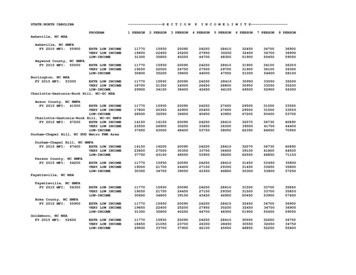
Transcription
“To the Person Sitting in Darkness”Mark Twain1901 In 1901 Mark Twain was world famous. He was not only the author of works like Tom Sawyer and Adventures ofHuckleberry Finn; he was also a sought-after speaker and humorist. But he saw nothing funny about the imperial policyof the US. He published this satiric protest in The North American Review. One of Twain’s concerns was that in implementing its imperial policies claiming to civilize the backward people’s of the world, the US would itself indulge in acts ofbarbarism.That fear was realized in the US military campaign against the Filipinos.The fighting was especially fierce onthe island of Samar. In order to defeat the enemy, US troops burned villages, killed wounded soldiers, and tortured andkilled civilians.There were also reports of rape and robbery.The war was finally brought to an end when US troops dressedin enemy uniforms to infiltrate enemy headquarters and capture the rebel leader, General Aguinaldo.The US justified thisviolation of the code of war agreed upon by all “civilized” nations because Aguinaldo had not been a signatory of the HagueConvention that ratified the code.Thus in dealing with him, the US claimed to have no obligation to follow the code. Incontrast, because Aguinaldo and his troops were combating the US, which had agreed to the code, the US claimed that therebels should be held accountable to it.Aguinaldo was captured a year after Twain’s piece appeared, so Twain cannot refer toit, but his satire does make us wonder who sits in light and who sits in darkness. —BROOK THOMASChristmas will dawn in the United States over a people full of hope and aspiration and good cheer. Such acondition means contentment and happiness.The carping grumbler who may here and there go forth willfind few to listen to him.The majority will wonder what is the matter with him and pass on.—New York Tribune, on Christmas Eve.From the Sun, of New York:The purpose of this article is not to describe the terrible offenses against humanity committed in thename of Politics in some of the most notorious East Side districts. They could not be described, even verbally. But it is the intention to let the great mass of more or less careless citizens of this beautifulmetropolis of the New World get some conception of the havoc and ruin wrought to man, woman,and child in the most densely populated and least-known section of the city. Name, date, and placecan be supplied to those of little faith—or to any man who feels himself aggrieved. It is a plain statement of record and observation, written without license and without garnish.Imagine, if you can, a section of the city territory completely dominated by one man, withoutwhose permission neither legitimate nor illegitimate business can be conducted; where illegitimate business is encouraged and legitimate business discouraged; where the respectable residents have to fasten theirdoors and windows summer nights and sit in their rooms with asphyxiating air and 100-degree temperature, rather than try to catch the faint whiff of breeze in their natural breathing places, the stoopsof their homes; where naked women dance by night in the streets, and unsexed men prowl like vultures throughthe darkness on “business” not only permitted but encouraged by the police; where the education of infantsbegins with the knowledge of prostitution and the training of little girls is training in the arts of Phryne;where American girls brought up with the refinements of American homes are imported from smalltowns up-state, Massachusetts, Connecticut, and New Jersey, and kept as virtually prisoners as if109
they were locked up behind jail bars until they have lost all semblance of womanhood; where smallboys are taught to solicit for the women of disorderly houses; where there is an organized society of youngmen whose sole business in life is to corrupt young girls and turn them over to bawdy houses; where men walking with their wives along the street are openly insulted; where children that have adult diseases are thechief patrons of the hospitals and dispensaries; where it is the rule, rather than the exception, that murder,rape, robbery, and theft go unpunished—in short where the Premium of the most awful forms of Vice isthe Profit of the politicians.The following news from China appeared in the Sun, of New York, on Christmas Eve.The italics aremine:The Rev. Mr. Ament, of the American Board of Foreign Missions, has returned from a trip which hemade for the purpose of collecting indemnities for damages done by Boxers. Everywhere he went he compelled the Chinese to pay. He says that all his native Christians are now provided for. He had 700 ofthem under his charge, and 300 were killed. He has collected 300 taels for each of these murders, andhas compelled full payment for all the property belonging to Christians that was destroyed. He also assessedfines amounting to THIRTEEN TIMES the amount of the indemnity. This money will be used for the propagation of the Gospel.Mr. Ament declares that the compensation he has collected is moderate when compared with theamount secured by the Catholics, who demand, in addition to money, head for head. They collect 500taels for each murder of a Catholic. In the Wenchiu country, 680 Catholics were killed, and for thisthe European Catholics here demand 750,000 strings of cash and 680 heads.In the course of a conversation, Mr. Ament referred to the attitude of the missionaries towardthe Chinese. He said:“I deny emphatically that the missionaries are vindictive, that they generally looted, or that theyhave done anything since the siege that the circumstances did not demand. I criticize the Americans. Thesoft hand of the Americans is not as good as the mailed fist of the Germans. If you deal with the Chinese witha soft hand they will take advantage of it.“The statement that the French government will return the loot taken by the French soldiers isthe source of the greatest amusement here. The French soldiers were more systematic looters thanthe Germans, and it is a fact that to-day Catholic Christians, carrying French flags and armed with modern guns, are looting villages in the Province of Chili.”By happy luck, we get all these glad tidings on Christmas Eve—just in time to enable us to celebrate the day with proper gaiety and enthusiasm. Our spirits soar, and we find we can even makejokes:Taels, I win, Heads you lose.Our Reverend Ament is the right man in the right place.What we want of our missionaries outthere is, not that they shall merely represent in their acts and persons the grace and gentleness andcharity and loving-kindness of our religion, but that they shall also represent the American spirit.The oldest Americans are the Pawnees. Macallum’s History says:When a white Boxer kills a Pawnee and destroys his property, the other Pawnees do not trouble toseek him out, they kill any white person that comes along; also, they make some white village paydeceased’s heirs the full cash value of deceased, together with full cash value of the property destroyed;they also make the village pay, in addition, thirteen times the value of that property into a fund for the110Associations/Dissociations
dissemination of the Pawnee religion, which they regard as the best of all religions for the softeningand humanizing of the heart of man. It is their idea that it is only fair and right that the innocent shouldbe made to suffer for the guilty, and that it is better that ninety and nine innocent should suffer thanthat one guilty person should escape.Our Reverend Ament is justifiably jealous of those enterprising Catholics who not only get bigmoney for each lost convert but get “head for head” besides. But he should soothe himself with thereflections that the entirety of their exactions are for their own pockets, whereas he, less selfishly,devotes only 300 taels per head to that service, and gives the whole vast thirteen repetitions of theproperty-indemnity to the service of propagating the Gospel. His magnanimity has won him theapproval of his nation and will get him a monument. Let him be content with these rewards.We allhold him dear for manfully defending his fellow missionaries from exaggerated charges which werebeginning to distress us, but which his testimony has so considerably modified that we can now contemplate them without noticeable pain. For now we know that, even before the siege, the missionaries were not “generally” out looting, and that “since the siege” they have acted quite handsomely,except when “circumstances” crowded them. I am arranging for the monument. Subscriptions for itcan be sent to the American Board, designs for it can be sent to me. Designs must allegorically setforth the Thirteen Reduplications of the Indemnity and the Object for which they were exacted; asOrnaments the designs must exhibit 680 Heads, so disposed as to give a pleasing and pretty effect,for the Catholics have done nicely, and are entitled to notice in the monument. Mottoes may be suggested, if any shall be discovered that will satisfactorily cover the ground.Mr. Ament’s financial feat of squeezing a thirteen-fold indemnity out of the pauper peasants tosquare other people’s offenses, thus condemning them and their women and innocent little childrento inevitable starvation and lingering death, in order that the blood money so acquired might be“used for the propagation of the Gospel,” does not flutter my serenity; although the act and the words,taken together, concrete a blasphemy so hideous and so colossal that without doubt its mate is notfindable in the history of this or of any other age.Yet if a layman had done that thing and justified itwith those words, I should have shuddered, I know. Or if I had done the thing and said the wordsmyself—However, the thought is unthinkable, irreverent as some imperfectly informed people thinkme. Sometimes an ordained minister sets out to be blasphemous.When this happens the layman is outof the running; he stands no chance.We have Mr.Ament’s impassioned assurance that the missionaries are not “vindictive.” Let us hopeand pray that they will never become so, but will remain in the almost morbidly fair and just andgentle temper which is affording so much satisfaction to their brother and champion today.The following is from the New York Tribune of Christmas Eve. It comes from that journal’s Tokyocorrespondent. It has a strange and impudent sound, but the Japanese are but partially civilized as yet.When they become wholly civilized they will not talk so:The missionary question, of course, occupies a foremost place in the discussion. It is now felt asessential that the Western Powers take cognizance of the sentiment here, that religious invasions of Oriental countries by powerful Western organizations are tantamount to filibustering expeditions, andshould not only be discountenanced, but that stern measures should be adopted for their suppression.“To the Person Sitting in Darkness”111
The feeling here is that the missionary organizations constitute a constant menace to peaceful international relations.Shall we? That is, shall we go on conferring our Civilization upon the peoples that sit in darkness,or shall we give those poor things a rest? Shall we bang right ahead in our old-time, loud, pious way,and commit the new century to the game; or shall we sober up and sit down and think it over first?Would it not be prudent to get our Civilization tools together and see how much stock is left onhand in the way of Glass Beads and Theology, and Maxim Guns and Hymn Books, and Trade Gin andTorches of Progress and Enlightenment (patent adjustable ones, good to fire villages with, uponoccasion), and balance the books and arrive at the profit and loss, so that we may intelligently decidewhether to continue the business or sell out the property and start a new Civilization Scheme on theproceeds?Extending the Blessings of Civilization to our Brother who Sits in Darkness has been a goodtrade and has paid well, on the whole; and there is money in it yet, if carefully worked—but notenough, in my judgment, to make any considerable risk advisable. The People that Sit in Darknessare getting to be too scarce—too scarce and too shy. And such darkness as is now left is really of butan indifferent quality, and not dark enough for the game.The most of those People that Sit in Darkness have been furnished with more light than was good for them or profitable for us.We have beeninjudicious.The Blessings-of-Civilization Trust, wisely and cautiously administered, is a Daisy.There is moremoney in it, more territory, more sovereignty and other kinds of emolument, than there is in anyother game that is played. But Christendom has been playing it badly of late years and must certainlysuffer by it, in my opinion. She has been so eager to get every stake that appeared on the green cloththat the People who Sit in Darkness have noticed it—they have noticed it and have begun to showalarm.They have become suspicious of the Blessings of Civilization. More—they have begun to examine them. This is not well. The Blessings of Civilization are all right, and a good commercial property; there could not be a better, in a dim light. In the right kind of a light and at a proper distance,with the goods a little out of focus, they furnish this desirable exhibit to the Gentlemen who Sit tion to the WeakTemperanceLaw and OrderLibertyEqualityHonorable DealingMercyEducation—and so on.There. Is it good? Sir, it is pie. It will bring into camp any idiot that sits in darkness anywhere.But not if we adulterate it. It is proper to be emphatic upon that point. This brand is strictly forExport—apparently. Apparently. Privately and confidentially, it is nothing of the kind. Privately and112Associations/Dissociations
confidentially, it is merely an outside cover, gay and pretty and attractive, displaying the special patterns of our Civilization which we reserve for Home Consumption, while inside the bale is the ActualThing that the Customer Sitting in Darkness buys with his blood and tears and land and liberty.ThatActual Thing is indeed Civilization, but it is only for Export. Is there a difference between the twobrands? In some of the details, yes.We all know that the Business is being ruined. The reason is not far to seek. It is because ourMr. McKinley, and Mr. Chamberlain, and the Kaiser and the Tsar and the French have been exporting the Actual Thing with the outside cover left off. This is bad for the Game. It shows that these newplayers of it are not sufficiently acquainted with it.It is a distress to look on and note the mismoves, they are so strange and so awkward. Mr. Chamberlain manufactures a war out of materials so inadequate and so fanciful that they make the boxesgrieve and the gallery laugh, and he tries hard to persuade himself that it isn’t purely a private raidfor cash but has a sort of dim, vague respectability about it somewhere, if he could only find thespot; and that by and by he can scour the flag clean again after he has finished dragging it through themud, and make it shine and flash in the vault of heaven once more as it had shone and flashed therea thousand years in the world’s respect until he laid his unfaithful hand upon it. It is bad play—bad.For it exposes the Actual Thing to Them that Sit in Darkness, and they say: “What! Christian againstChristian? And only for money? Is this a case of magnanimity, forbearance, love, gentleness, mercy,protection of the weak—this strange and overshowy onslaught of an elephant upon a nest of fieldmice, on the pretext that the mice had squeaked an insolence at him—conduct which ‘no self-respectinggovernment could allow to pass unavenged’? as Mr. Chamberlain said. Was that a good pretext in asmall case, when it had not been a good pretext in a large one?—for only recently Russia had affrontedthe elephant three times and survived alive and unsmitten. Is this Civilization and Progress? Is itsomething better than we already possess? These harryings and burnings and desert-makings in theTransvaal—is this an improvement on our darkness? Is it, perhaps, possible that there are two kindsof Civilization—one for home consumption and one for the heathen market?”Then They that Sit in Darkness are troubled, and shake their heads, and they read this extract froma letter of a British private, recounting his exploits in one of Methuen’s victories some days beforethe affair of Magersfontein, and they are troubled again:We tore up the hill and into the intrenchments, and the Boers saw we had them; so they dropped theirguns and went down on their knees and put up their hands clasped, and begged for mercy. And wegave it them—with the long spoon.The long spoon is the bayonet. See Lloyd’sWeekly, London, of those days.The same number—andthe same column—contained some quite unconscious satire in the form of shocked and bitter upbraidings of the Boers for their brutalities and inhumanities!Next, to our heavy damage, the Kaiser went to playing the game without first mastering it. Helost a couple of missionaries in a riot in Shantung, and in his account he made an overcharge forthem. China had to pay a hundred thousand dollars apiece for them in money; twelve miles of territory, containing several millions of inhabitants and worth twenty million dollars; and to build a“To the Person Sitting in Darkness”113
monument and also a Christian church; whereas the people of China could have been depended uponto remember the missionaries without the help of these expensive memorials.This was all bad play.Bad, because it would not, and will not now or ever, deceive the Person Sitting in Darkness. Heknows that it was an overcharge. He knows that a missionary is like any other man: he is worth merelywhat you can supply his place for and no more. He is useful, but so is a doctor, so is a sheriff, so isan editor; but a just Emperor does not charge war prices for such.A diligent, intelligent, but obscuremissionary, and a diligent, intelligent country editor are worth much, and we know it; but they arenot worth the earth.We esteem such an editor and we are sorry to see him go, but when he goes,we should consider twelve miles of territory and a church and a fortune overcompensation for hisloss. I mean, if he was a Chinese editor and we had to settle for him. It is no proper figure for aneditor or a missionary; one can get shop-worn kings for less. It was bad play on the Kaiser’s part. Itgot this property, true; but it produced the Chinese revolt, the indignant uprising of China’s traducedpatriots, the Boxers. The results have been expensive to Germany and to the other Disseminatorsof Progress and the Blessings of Civilization.The Kaiser’s claim was paid, yet it was bad play, for it could not fail to have an evil effect uponPersons Sitting in Darkness in China. They would muse upon the event and be likely to say: “Civilization is gracious and beautiful, for such is its reputation, but can we afford it? There are rich Chinamen, perhaps they can afford it; but this tax is not laid upon them, it is laid upon the peasants ofShantung; it is they that must pay this mighty sum and their wages are but four cents a day. Is this abetter civilization than ours, and holier and higher and nobler? Is not this rapacity? Is not this extortion? Would Germany charge America two hundred thousand dollars for two missionaries, and shakethe mailed fist in her face and send warships and send soldiers, and say, ‘Seize twelve miles of territory, worth twenty millions of dollars, as additional pay for the missionaries, and make those peasants build a monument to the missionaries, and a costly Christian church to remember them by?’And later would Germany say to her soldiers,‘March through America and slay, giving no quarter; makethe German face there, as has been our Hun-face here, a terror for a thousand years; march throughthe Great Republic and slay, slay, slay, carving a road for our offended religion through its heart andbowels?’Would Germany do like this to America, to England, to France, to Russia? Or only to China,the helpless—imitating the elephant’s assault upon the field mice? Had we better invest in this Civilization—this Civilization which called Napoleon a buccaneer for carrying off Venice’s bronze horses,but which steals our ancient astronomical instruments from our walls and goes looting like commonbandits—that is, all the alien soldiers except America’s; and (Americans again excepted) storms frightened villages and cables the result to glad journals at home every day:‘Chinese losses, 450 killed; ours,one officer and two men wounded. Shall proceed against neighboring village tomorrow, where a massacreis reported.’ Can we afford Civilization?”And next Russia must go and play the game injudiciously. She affronts England once or twice—with the Person Sitting in Darkness observing and noting; by moral assistance of France and Germany,she robs Japan of her hard-earned spoil, all swimming in Chinese blood—Port Arthur—with the Person again observing and noting; then she seizes Manchuria, raids its villages, and chokes its greatriver with the swollen corpses of countless massacred peasants—that astonished Person still observing and noting. And perhaps he is saying to himself, “It is yet another Civilized Power, with its banner114Associations/Dissociations
of the Prince of Peace in one hand and its loot basket and its butcher knife in the other. Is there nosalvation for us but to adopt Civilization and lift ourselves down to its level?”And by and by comes America, and our Master of the Game plays it badly—plays it as Mr. Chamberlain was playing it in South Africa. It was a mistake to do that; also, it was one which was quiteunlooked for in a Master who was playing it so well in Cuba. In Cuba, he was playing the usual andregular American game and it was winning, for there is no way to beat it.The Master, contemplatingCuba, said, “Here is an oppressed and friendless little nation which is willing to fight to be free; wego partners, and put up the strength of seventy million sympathizers and the resources of the UnitedStates: play!” Nothing but Europe combined could call that hand, and Europe cannot combine onanything.There in Cuba he was following our great traditions in a way which made us very proud ofhim, and proud of the deep dissatisfaction which his play was provoking in continental Europe. Movedby a high inspiration, he threw out those stirring words which proclaimed that forcible annexationwould be “criminal aggression,” and in that utterance fired another “shot heard round the world.”Thememory of that fine saying will be outlived by the remembrance of no act of his but one—that heforgot it within the twelvemonth, and its honorable gospel along with it.For presently came the Philippine temptation. It was strong, it was too strong, and he made thatbad mistake: he played the European game, the Chamberlain game. It was a pity, it was a great pity,that error—that one grievous error, that irrevocable error. For it was the very place and time to playthe American game again. And at no cost. Rich winnings to be gathered in, too, rich and permanent,indestructible, a fortune transmissible forever to the children of the flag. Not land, not money, notdominion—no, something worth many times more than that dross: our share, the spectacle of a nationof long harassed and persecuted slaves set free through our influence; our posterity’s share, the goldenmemory of that fair deed.The game was in our hands. If it had been played according to the American rules, Dewey would have sailed away from Manila as soon as he had destroyed the Spanish fleet—after putting up a sign on shore guaranteeing foreign property and life against damage by the Filipinos,and warning the Powers that interference with the emancipated patriots would be regarded as an actunfriendly to the United States.The Powers cannot combine in even a bad cause, and the sign wouldnot have been molested.Dewey could have gone about his affairs elsewhere and left the competent Filipino army tostarve out the little Spanish garrison and send it home, and the Filipino citizens to set up the form ofgovernment they might prefer and deal with the friars and their doubtful acquisitions according toFilipino ideas of fairness and justice—ideas which have since been tested and found to be of as highan order as any that prevail in Europe or America.But we played the Chamberlain game and lost the chance to add another Cuba and another honorable deed to our good record.The more we examine the mistake, the more clearly we perceive that it is going to be bad forthe Business.The Person Sitting in Darkness is almost sure to say, “There is something curious aboutthis—curious and unaccountable. There must be two Americas, one that sets the captive free, andone that takes a once-captive’s new freedom away from him, and picks a quarrel with him with nothing to found it on, then kills him to get his land.”“To the Person Sitting in Darkness”115
The truth is, the Person Sitting in Darkness is saying things like that, and for the sake of the Business we must persuade him to look at the Philippine matter in another and healthier way. We mustarrange his opinions for him. I believe it can be done, for Mr. Chamberlain has arranged England’sopinion of the South African matter and done it most cleverly and successfully. He presented thefacts—some of the facts—and showed those confiding people what the facts meant. He did it statistically, which is a good way. He used the formula: “Twice 2 are 14, and 2 from 9 leaves 35.” Figuresare effective; figures will convince the elect.Now, my plan is a still bolder one than Mr. Chamberlain’s, though apparently a copy of it. Let usbe franker than Mr. Chamberlain; let us audaciously present the whole of the facts, shirking none,then explain them according to Mr. Chamberlain’s formula. This daring truthfulness will astonishand dazzle the Person Sitting in Darkness, and he will take the Explanation down before his mentalvision has had time to get back into focus. Let us say to him:“Our case is simple. On the first of May, Dewey destroyed the Spanish fleet.This left the Archipelago in the hands of its proper and rightful owners, the Filipino nation.Their army numbered 30,000men and they were competent to whip out or starve out the little Spanish garrison; then the peoplecould set up a government of their own devising. Our traditions required that Dewey should now setup his warning sign and go away. But the Master of the Game happened to think of another plan—the European plan. He acted upon it. This was to send out an army—ostensibly to help the nativepatriots put the finishing touch upon their long and plucky struggle for independence, but really totake their land away from them and keep it.That is, in the interest of Progress and Civilization.Theplan developed stage by stage, and quite satisfactorily. We entered into a military alliance with thetrusting Filipinos and they hemmed in Manila on the land side, and by their valuable help the place,with its garrison of 8,000 or 10,000 Spaniards, was captured—a thing which we could not have accomplished unaided at that time.We got their help by—by ingenuity.We knew they were fighting for theirindependence and that they had been at it for two years.We knew they supposed that we also werefighting in their worthy cause—just as we had helped the Cubans fight for Cuban independence—and we allowed them to go on thinking so. Until Manila was ours and we could get along without them.Then we showed our hand. Of course, they were surprised—that was natural, surprised and disappointed, disappointed and grieved.To them it looked un-American, uncharacteristic, foreign to ourestablished traditions. And this was natural, too, for we were only playing the American Game inpublic—in private it was the European. It was neatly done, very neatly, and it bewildered them.They could not understand it, for we had been so friendly—so affectionate, even—with thosesimple-minded patriots! We, our own selves, had brought back out of exile their leader, their hero,their hope, their Washington—Aguinaldo, brought him in a warship, in high honor, under the sacredshelter and hospitality of the flag; brought him back and restored him to his people and got their moving and eloquent gratitude for it.Yes, we had been so friendly to them and had heartened them up inso many ways! We had lent them guns and ammunition; advised with them; exchanged pleasant courtesies with them; placed our sick and wounded in their kindly care; intrusted our Spanish prisonersto their humane and honest hands; fought shoulder to shoulder with them against “the common enemy”(our own phrase); praised their courage, praised their gallantry, praised their mercifulness, praised116Associations/Dissociations
their fine and honorable conduct; borrowed their trenches, borrowed strong positions which they hadpreviously captured from the Spaniards; petted them, lied to them—officially proclaiming that ourland and naval forces came to give them their freedom and displace the bad Spanish Goverment—fooled them, used them until we needed them no longer, then derided the sucked orange and threwit away.We kept the positions which we had beguiled them of, by and by we moved a force forwardand overlapped patriot ground—a clever thought, for we needed trouble and this would produce it.A Filipino soldier, crossing the ground, where no one had a right to forbid him, was shot by our sentry. The badgered patriots resented this with arms, without waiting to know whether Aguinaldo,who was absent, would approve or not. Aguinaldo did not approve, but that availed nothing. Whatwe wanted in the interest of Progress and Civilization was the Archipelago, unencumbered by patriots struggli
"To the Person Sitting in Darkness" Mark Twain 1901 In 1901 Mark Twain was world famous. He was not only the author of works like Tom Sawyerand Adventures of Huckleberry Finn;he was also a sought-after speaker and humorist.But he saw nothing funny about the imperial policy of the US.He published this satiric protest in The North American Review.One of Twain's concerns was that in imple-










